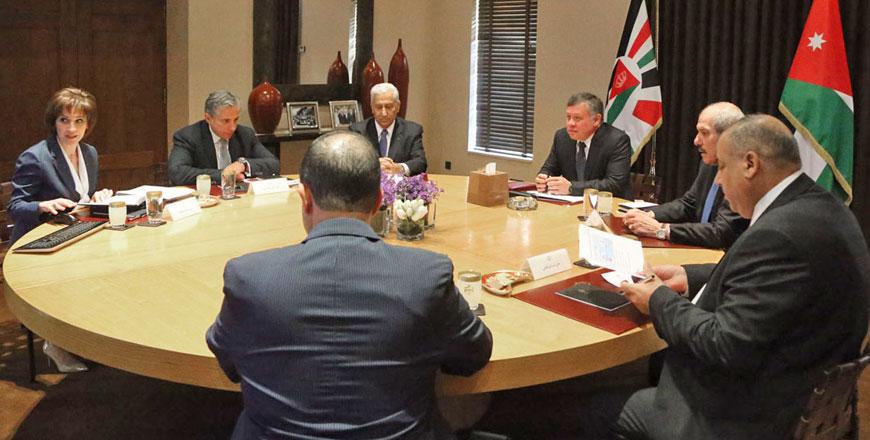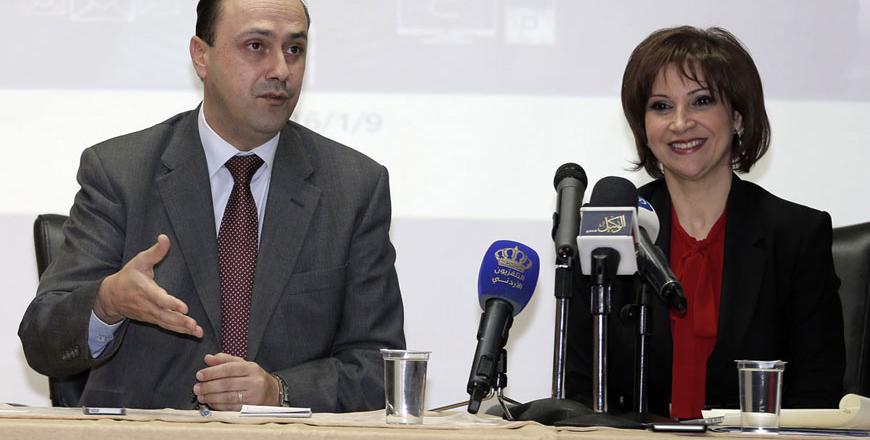You are here
Gov’t basic role is to offer quality services to the public — King
By JT - Apr 20,2016 - Last updated at Apr 20,2016

His Majesty King Abdullah meets with senior officials concerned with a smart card project in Amman on Wednesday (Photo courtesy of Royal Court)
AMMAN — His Majesty King Abdullah on Wednesday said that delivery of quality services to citizens lies at the core of efforts to improve the performance of government agencies, according to a Royal Court statement.
The King made his remarks during a meeting held at Al Husseiniya Palace to discuss government measures taken to execute the project of smart identification cards, and the progress achieved in the implementation of the plan.
King Abdullah stressed the importance of adopting the best specifications for the smart IDs, highlighting safety, multi-purpose use and essentiality of the service as the main features to be ensured, while he underlined time effectiveness in service delivery.
The King stressed once again the significance of the e-government project as it lies at the core of the government’s basic role: improving the level and quality of services offered to the public through simplifying measures and saving time and effort.
The discussion covered the stages of implementing the e-government project and online connection of civil service agencies around the Kingdom, especially in the fields of health and education.
For his part, Prime Minister Abdullah Ensour briefed His Majesty on the government’s approach to implement the smart IDs, which is part of the e-government project.
Through a steering committee handling the service, the government will make sure the cards are issued in accordance with the highest technical standards that ensure the safety of the data related to card holders, Ensour explained.
The premier highlighted the ICT sector’s role in implementing the e-government project, which, he said, seeks to ensure better performance, accuracy and swiftness in action, while minimising the probability of human errors.
ICT Minister Majd Shweikeh briefed His Majesty and the attendees on the progress in the project, noting that smart cards would ease procedures related to an array of services such as the issuance of civil IDs and passports and other documents, customs and exemptions, purchase and sale transactions, services related to the facilitation of investment and obtaining different types of licences.
They are also helpful when it comes to government transactions, such as health and social insurance, court records and other administrative measures.
Under the e-government project’s first phase, 50 services will be launched this year and 70 during the second phase next year the minister noted, adding that by the end of phase three in 2019, about 350 services will be in place.
In regard to the national fibre optic grid project for southern region, the minister said the network would connect around 3,200 educational, health, government and service institutions by the end of 2019.
The smart civil IDs rely on developing a central system through electronic interconnectivity and integration with all other relevant systems, provided that the needed infrastructure is in place, the statement said.
Shweikeh told the Jordan News Agency, Petra, that 64 per cent of the project is complete, while the rest will be wrapped up in the coming three months.
Related Articles
AMMAN — Interior Minister Mazen Qadi and ICT Minister Majd Shweikeh on Thursday checked on the measures and preparations taken by the Civil
ICT Minister Majd Shweikeh on Saturday met with members of the ICT Association of Jordan (int@j) and discussed ways to activate a partnership council with the private sector and speed up the implementation of e-government programmes.
AMMAN — Public agencies currently provide 100 e-services to citizens and more will be launched in the next few years, the government said Sa

















